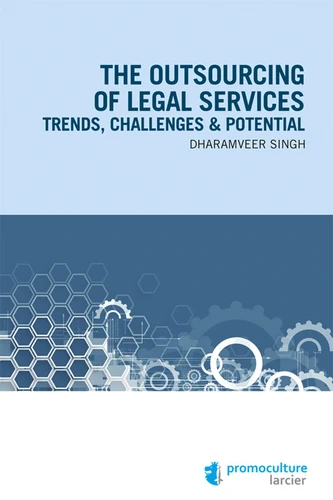The outsourcing of legal services. Trends, challenges & potential
Par :Formats :
Définitivement indisponible
Cet article ne peut plus être commandé sur notre site (ouvrage épuisé ou plus commercialisé). Il se peut néanmoins que l'éditeur imprime une nouvelle édition de cet ouvrage à l'avenir. Nous vous invitons donc à revenir périodiquement sur notre site.
- Paiement en ligne :
- Livraison à domicile ou en point Mondial Relay indisponible
- Retrait Click and Collect en magasin gratuit
- Réservation en ligne avec paiement en magasin :
- Indisponible pour réserver et payer en magasin
- Nombre de pages347
- PrésentationBroché
- Poids0.57 kg
- Dimensions16,0 cm × 24,0 cm × 2,0 cm
- ISBN978-2-87974-845-0
- EAN9782879748450
- Date de parution28/10/2015
- ÉditeurCoédition Promoculture/Larcier
Résumé
Economic globalization is transforming practically every service sector. The legal industry that has long remained insulated too has not remained untouched by the effects of globalization. The outsourcing of legal services in the past one decade has transformed the legal landscape. Legal outsourcing to India is becoming increasingly popular among U.S. and European law firms and corporations. This book broadly seeks to discuss three main topics surrounding legal process outsourcing (LPO) : its emerging trends, the legal challenges it raises and the hitherto unrecognized potential it holds.
Firstly, this book clarifies concepts of LPO and its operating models practiced by U.S. and U.K. law firms and corporations. Secondly, the outsourcing of legal services creates significant challenges for ethics rules including conflict of interests, attorney-client privilege, supervision and fee sharing. Thirdly, this research explores the hidden potential of LPO to improve access to justice. This book develops an altogether new proposal where Indian LPO professionals could help alleviate the access to justice problem among indigent and low-income populations of the United States.
Firstly, this book clarifies concepts of LPO and its operating models practiced by U.S. and U.K. law firms and corporations. Secondly, the outsourcing of legal services creates significant challenges for ethics rules including conflict of interests, attorney-client privilege, supervision and fee sharing. Thirdly, this research explores the hidden potential of LPO to improve access to justice. This book develops an altogether new proposal where Indian LPO professionals could help alleviate the access to justice problem among indigent and low-income populations of the United States.
Economic globalization is transforming practically every service sector. The legal industry that has long remained insulated too has not remained untouched by the effects of globalization. The outsourcing of legal services in the past one decade has transformed the legal landscape. Legal outsourcing to India is becoming increasingly popular among U.S. and European law firms and corporations. This book broadly seeks to discuss three main topics surrounding legal process outsourcing (LPO) : its emerging trends, the legal challenges it raises and the hitherto unrecognized potential it holds.
Firstly, this book clarifies concepts of LPO and its operating models practiced by U.S. and U.K. law firms and corporations. Secondly, the outsourcing of legal services creates significant challenges for ethics rules including conflict of interests, attorney-client privilege, supervision and fee sharing. Thirdly, this research explores the hidden potential of LPO to improve access to justice. This book develops an altogether new proposal where Indian LPO professionals could help alleviate the access to justice problem among indigent and low-income populations of the United States.
Firstly, this book clarifies concepts of LPO and its operating models practiced by U.S. and U.K. law firms and corporations. Secondly, the outsourcing of legal services creates significant challenges for ethics rules including conflict of interests, attorney-client privilege, supervision and fee sharing. Thirdly, this research explores the hidden potential of LPO to improve access to justice. This book develops an altogether new proposal where Indian LPO professionals could help alleviate the access to justice problem among indigent and low-income populations of the United States.


